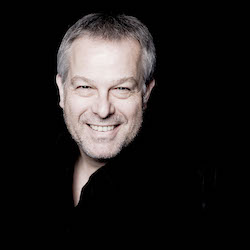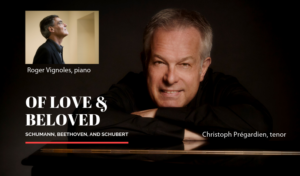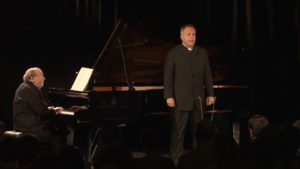
Christoph Prégardien
© Marco Borggreve
The first question we asked German tenor Christoph Prégardien was how he rehearsed with his accompanist, since Mr. Prégardien lived in Berlin and his accompanist for his upcoming March concert in Hong Kong lived in London and they both had busy performing schedules. He laughed and said that this problem was faced by every soloist and it was solved by their meeting in a city where one or the other was performing to have their rehearsals. In designing a program, he was careful to pick both works that were part of his core repertoire and adding a few new works each time, rather than designing a completely unfamiliar program.
For his Hong Kong program, he will open with Beethoven’s An die ferne Geliebte. This, Beethoven’s only song cycle, poses particular challenges for the singer. Beethoven is not a particularly melodic composer and his vocal writing is closer to instrumental writing. The writing is quite refined, but as a performer, Mr. Prégardien said it was far more important to focus on vocal control and phrasing than the melody. Beethoven was not a natural writer for the voice.
Beethoven: 6 Songs, Op. 75: No. 2. Neue Liebe, neues Leben (Christoph Prégardien, tenor; Michael Gees, piano)
Schubert, on the other hand, is accessible to all singers. His works are Classical in the sense of coming from a background that starts in the Baroque period and he’s one of the composers that Baroque singers find comfortable. Schumann extends Schubert’s ease with melody into the Romantic period, writing with a fluidity and ease that are very far away from Beethoven’s melodic struggles.
Schubert: Der Tod und das Madchen, Op. 7, No. 3, D. 531 (Christoph Prégardien, tenor; Michael Gees, piano)
Schumann’s Liederjahr of 1840, where he wrote some 140 songs, sprang from his love of Clara. As Schumann’s life continued, and he struggled with mental illness, his works become less easy to understand after around 1848. He was a consummate writer for the voice in 1840, however.
Schumann: Liederkreis, Op. 39: No. 12. Fruhlingsnacht (Christoph Prégardien, tenor; Michael Gees, piano)

© muse.hku.hk
We discussed 2020 as the ‘Beethoven Year’ and what that meant for him as a singer. Along with An die ferne Geliebte, Mr. Prégardien will also be singing Beethoven’s rarely performed folk music during the year. The songs of Scotland, Ireland, and Wales were written on commission for George Thomson of Edinburgh and, between 1809 and 1820, Beethoven completed nearly 200 settings. These settings, for voice and piano trio, used melodies given to him by Thomson, who had devoted his life to collecting these songs. For Mr. Prégardien, these chamber works pose problems of not only interpretation but also of working with a piano trio. Instrumental trios rarely work with singers and they need to learn how to support the voice, giving it breathing space and, sometimes, learning a differing interpretation as needed by the voice. Mr. Prégardien spoke of a time when he was rehearsing Schubert’s Winterreise with pianist Menahem Pressler. The older Pressler was not used to working with singers and the first part of the rehearsal was difficult as they just weren’t together. After about 30 minutes, though, Mr. Pressler understood the need to be flexible and it all worked beautifully.
In speaking further about the Scottish, Irish, and Welsh folksongs, we explored the idea of Beethoven’s understanding of the text. Mr. Prégardien thought he understood the mood and the contents, but probably not the individual words, since so many of the texts are in dialect, such as this line from ‘Duncan Gray,’ WoO. 156, No. 2 of the 12 Scottish Songs: ‘Now they’re crouse and canty baith’ meaning ‘Now they’re both happy and cheerful’!

Christoph Prégardien with Menahem Pressler
© i.ytimg.com
In looking at Lieder as a performing art, Mr. Prégardien said that during his 35 years on stage, he’s heard the same litany: lieder recitals are hard to sell because their audience is so small. Yet, when we were discussing a live concert versus a recorded concert, it was the live concert that was the most affective. He felt that audiences had to prepare themselves differently for a lieder recital than, say, an opera. The audience has to be able to give itself into the mood of the poetry and be prepared to be ‘emotionalized.’ Sitting in a small darkened concert hall with 300 people and feeling the emotion of the music becomes an almost spiritual experience.
We talked about the often misogynistic lyrics, of the male poet speaking for a woman’s emotions, and he felt that with the number of songs that were being sung by both men and women singers, there was a more open-minded attitude to this. Historically, we understand how talented women were limited by 18th- and 19th-century society and kept out of the spotlight. A song cycle such as Winterreise is more dependent on the emotional state of the singer than the singer’s gender. A song cycle such as Die schöne Müllerin has its tragedy as much in the fact that all of the romance is in the young miller’s head – what would the story be if he actually talked to the woman of his dreams?
His travel plans for 2020 are more Europe-based. He’ll be in Hong Kong in March and in Japan in November. An April trip to Shanghai has been postponed and there are no trips to the US this year. Travel in airplanes is very drying and he said that after a flight, he needs 2 to 3 days to recover before a performance. He loves travelling and explores new cities’ museums and restaurants, in addition to shopping. With a 10-year-old and a 15-year-old at home and his teaching, however, he likes coming home.




